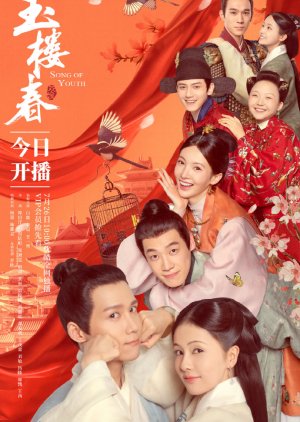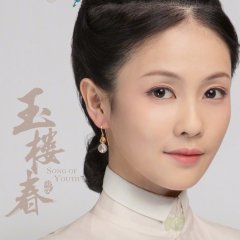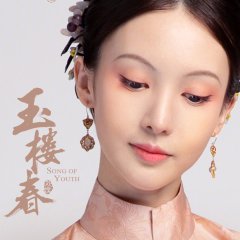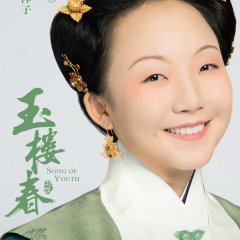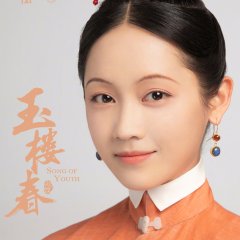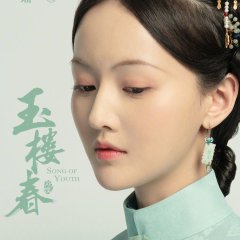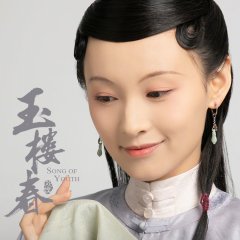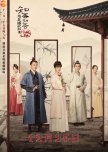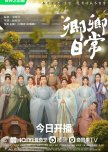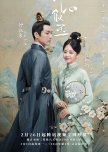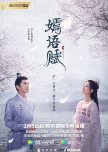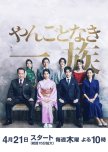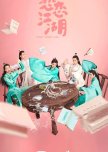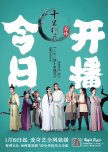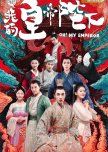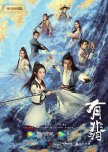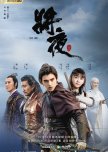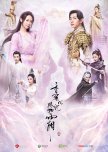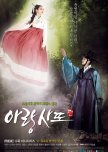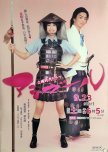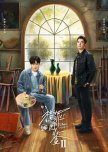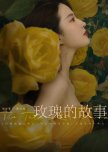 Ultra Fan Guide: Bai Lu
Ultra Fan Guide: Bai Lu Durante o reinado do imperador Long Qing, da dinastia Ming (em meados do século XVI), viveu Lin Shao Chun, filha de um ex-oficial do governo. Seu pai perdeu o cargo após ser acusado de desvio de dinheiro e corrupção, caiu em desgraça e levou família junto com ele. Para ajudar no sustento da família, ela se junta a uma trupe de artistas itinerantes – onde ela conhece Sun Yu Lou, herdeiro de uma família rica, que se apaixona por ela à primeira vista. No entanto, Lin Shao Shun não pretende permanecer com a trupe por muito tempo, pois o que ela quer mesmo é se vingar de quem fez mal à sua família. Ela planeja se tornar uma funcionária pública, e para isso ela precisa se disfarçar de homem para poder participar do concurso. Sun Yu Lou decide ajudá-la, mesmo que, de início, sua família se oponha veementemente. Independente de toda essa situação, os dois ficam muito próximos e acabam se casando. No entanto, Lin Shao Chun descobre que um dos membros da família de seu marido pode ter tido participação nos eventos que levaram à queda de sua própria família, e agora se vê em um verdadeiro dilema... (Fonte: Viki) Editar Tradução
- Português (Brasil)
- Русский
- Deutsch
- Română
- Título original: 玉楼春
- Também conhecido como: Song of Youth , Yu Lou Chun
- Diretor: Gao Han, Bai Yun Mo
- Gêneros: Histórico, Comédia, Romance, Drama
Onde assistir Canção da Juventude
Elenco e Créditos
- Bai Lu Papel Principal
- Wang Yi Zhe Papel Principal
- Gina JinXu Feng QiaoPapel Principal
- Jackie LiWu Yue Hong [Shi Jie's wife]Papel Secundário
- He LeiSun Shi Jie [Sun family's eldest son]Papel Secundário
- Zhou Lu LaSun Jun Hao [Sun family's 2nd son]Papel Secundário
Resenhas

Women hold up half the sky.
Song of Youth is a historical Chinese soap opera that pays tribute to 红楼梦 Hongloumeng (Dream of the Red Chamber), widely regarded as China's greatest novel. Fans of the novel will immediately recognize that the backstory of an aristocratic family in decline and the multiple character blueprints that are based on this vernacular classic. Uniquely, this narrative plucks out the all-consuming, angsty, tragically epic love triangle that forms the core of the novel and focuses instead on broader, often less appreciated themes. The love triangle is still there but it is been muted to the extent that it is only peeks out towards the end.Lin Shaochun, a talented actress from a performing troupe marries Sun Yulou, the youngest scion of the noble Sun family. With her innate resourcefulness and the support of her husband, she becomes indispensable to his initially disapproving family by ably resolving all their internal and external conflicts and challenges. Bai Lu as always delivers a very enjoyable performance as the supportive and loving wife of Sun Yulou and the clever, thoughtful and femininely authoritative Sun family fixer. Even though I think Wang Yizhe has a lot of potential as an actor, he struggled to get into character and I didn't see much spark between him and Bai Lu. But it doesn't matter because albeit with some challenges, their arc is short and it is ultimately a rather pedestrian love match. After that the narrative explores more complicated and more poignant relationships where the couples have limited ability to make their own choices. Very much like Court Lady, Lin Shaochun is just a tour guide through the social structures, culture, relationships, vanities and daily life details of feudal 18th century China. Thankfully unlike Court Lady, Bai Lu's portrayal of the role as occasionally ruthless and not overly preachy and righteous makes Lin Shaochun very likeable if too infallible to be that interesting.
What stands out about this drama is that very much like Hongloumeng, it celebrates the contribution of women to society - Mao Zedong was far from the first to acknowledge that women hold up half the sky. True to the novel, the drama is very female centric - Lin Shaochun is the main protagonist and in a fitting role reversal the ML Sun Yulou is just a prop; an attractive, decorative vase. Even the best antagonists are formidable and devious women. In fact, most of the male characters in the drama are rather weak and not that intelligent - Sun Yulou only pulls himself together to be worthy of Lin Shaochun, his oldest brother is a foolish gold digger's wet dream, his second brother is the most capable of the lot and his third brother is a henpecked wastrel. All of them become better, more successful men thanks to their smart, determined and capable wives. I find both the eldest and (especially) the second brothers' stories to be far more interesting than that of the main CP. Unfortunately the second brother's story fizzles out in the middle and ends in a slightly disappointing way. Nonetheless, Yao Dizu is by far the most multi-faceted and refreshing character in the drama, more so than Lin Shaochun. She is also the only character that gets to be the author of her own story. If Lin Shaochun were written to be more of a bystander and less of the person who always saves the day, this would be a much better drama. She always wins by the same modus operandi so by the second or third arc, I was on to her and the "twists" become predictable.
The other problem with this drama is that it doesn't seem to be written in one voice or tone and thus gives the impression that it doesn't know what it wants to be. I think it is intended to be a satire or parody of bourgeois upper society during Ming Dynasty. Unfortunately in parts the humor is quite slapstick when it comes to Lamu Yangzi and some of Jin Chen's scenes because that matches the kind of humor they do best. Bai Lu and the rest of the cast however, are better suited towards more subtle, satirical humor and when the writing tries for something in between, it comes across as forced and half the time it misses the mark. That said, there are some really good laugh out loud moments but overall the wit and humor is hit or miss. The rhythm of the screenplay is particularly awkward at the beginning but more enjoyable from the middle episodes. After the four brothers' stories, the recycling of themes around the fallout from arranged marriages gets old and the final arcs flatline - I saw the final end twist a mile away so the end was predictable and anti-climatic.
This gorgeous production was clearly shot with meticulous attention to detail from the sets to the authenticity of the costumes, make up and the cultural details. The only lapse is perhaps the fact that the classic Cantonese opera Legend of the Purple Hairpin is sung in Mandarin and not in its original language (this was one of my grandma's favorite operas, she used to play the Liza Wang/Adam Cheng recording all the time). Overall a high quality production that is an enjoyable light watch even though it falls well short of Hongloumeng in terms of panoramic impression, breadth of social commentary and lasting impact. This is fun enough for me to rate this a 7.5.

A Satire of the Ming Dynasty Society
Watching this drama from a satirical perspective of the society during the Ming Dynasty, when Confucianism was practiced at its utmost height, decorum and protocols were strict, harsh and repressive especially for the women, makes it a very enjoyable watch for me. Seemingly unlikely, we get a couple of very strong female characters in particular a know-it-all Mary Sue who always saves the day. All the characters and their relationships have realistically captured life in that orthodox and conservative society, and that can even be relevant in today’s world.This story takes a bold look into the Ming dynasty society, its orthodoxy and conservatism, its inequality, protocol, manners, expectations, and consequences, with the hidden criticisms that all these had led to the slow decline of the society and the ending of the dynasty.
Accordingly, the drama draws its inspirations from the great classical “Dream of the Red Chamber” with several of the characters deriving their names in a combination of words from the classic novel. The whole story revolves around the high status, wealthy and powerful Sun (pronounced Soon) family, narrated from the perspective of the youngest son, Sun Yulou (Wang Yizhe) who has a high powered father, a doting mother, three brothers and four sisters, each has a story to tell.
Like in the classical “Dream of the Red Chamber”, this story also hints at “truth becomes fiction when the fiction’s true; real becomes not-real where the unreal’s real” by the use of a puppet show in telling the story. Cleverly constructed, there are hints and cross-references to hidden (and obvious) meanings throughout. Truth and falsity, reality and illusion are constant displays.
Undoubtedly marriages by the order of the parents tend to be the most painful experiences for almost every couple even in a society where filial piety is held as the highest order of all. In the high society, statuses and face are always the forefront consideration of any marriages which are used to advance the careers of family members, usually at the expense of daughters, though some sons don’t fare too well either. The consequences are expected: extra marital affair, adultery, love triangle, elope, rebellion - all brilliantly captured in the story.
Sun Yulou rebels against his stern father and the social barriers of the time. He and Lin Shaochun (Bai Lu) pursue individual freedom, gender equality and to marry the partner of one’s choice. This couple has an initial sense of democracy, a rebellious spirit and courageous pursuit of love. Though well-read with traditional books of morals and ethics, Lin Shaochun toes the line from time to time. She convinces Sun Yulou to pass the Imperial exam so that he could become a government official and ask for her hand in marriage.
This is the first drama for Wang Yizhe as the main male lead. Many viewers don't feel he deserves such a role. For me, I would like to give him a chance without looking at him through tinted lenses. I feel his acting has brilliantly brought out the youthfulness of the character. He can look serious when he needs to, but in front of the family, especially his wife, he's just a big sunny boy that can be silly and Wang Yizhe delivers. Despite this being a main lead, it feels more like a supporting role because of how the character is being written, shot and edited.
Many viewers feel the main couple don't have the chemistry. Though they are both of the same age at 18, Lin Shaochun is more mature compared with Sun Yulou, and he always lets her have the final say. With that, it does feel that Sun Yulou a little brother who depends heavily on Lin Shaochun the big sister. For me, the lacking perhaps lies more on Bai Lu as she seems to be less enthusiastic and doesn’t share the same adoration and affection towards her supposedly husband as he has on her.
My Verdict
Despite some flaws here and there, this is a very enjoyable story with a series of side stories which are very well developed and in fact more interesting than the lead couple’s story. It consists a blend of realism and romance, psychological motivation and fate, and daily life with a grand plot hidden and span across multi side storyline. It can be hilarious at times, yet, bitter and resigned when it comes to the fate of some characters. The first episode is comedic and funny. I thought it's going to be light and laughable, but by episode 8, it becomes heavy and bitter.
This is a satire about misogyny, hypocrisy, class system, conservatism, inequality, all told in a very humorous way. Some parts are so funny that I laugh so hard.
The final narrative about how people make choices that determine their eventual endings: take kindness one ends well, take hatred one loses everything, seems to be a just decoy for the deeper meaning of the overall story – a silent criticism of the paternalistic system of the country.
Great story telling. Don’t miss it!
BRAVO!

